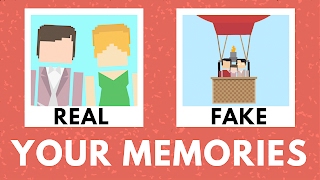(单词翻译:单击)
Hey there! Welcome to Life Noggin.
大家好!欢迎来到脑洞大开的生命奇想!
You're currently living in a world where people document their lives in more unique ways than ever before.
你们现在生活的世界里,大家记录生活的方式比从前更加独特。
You can post a picture to social media, upload a vlog to YouTube, or go old-school and make a scrapbook.
你可以把照片发到社交媒体上,上传视频到YouTube,或者去老学校做剪贴簿。
And what's great about these things is that it gives you countless ways to look back at different life events and recall certain memories, like that time you got married or that time your dog wouldn't stop rolling around in the mud.
这些方式的伟大之处在于,它给了你很多方式去回顾生活事件,回忆起某些事情,比如你结婚了或是你的狗在泥里滚来滚去不肯出来。
Still pretty cute, though. Look at that pulper go. And there are lots of ways to trigger certain memories, too, like smelling a certain scent or hearing a certain sound.
不过,还是很可爱的。看这个搅拌机。还有很多方法也可以触发记忆,比如闻到某种气味或者听到某种声音。
But what's actually happening in the brain when one of these memories is triggered? And are those memories always correct?
但是记忆被触发时,大脑会发生什么呢?那些记忆都是正确的吗? We've all been there -- you're in your kitchen and you get a whiff of some potato chips and suddenly, you're taken back to a time where you were up all night snacking and playing the newest Mass Effect game. Oh, I miss college.
We've all been there -- you're in your kitchen and you get a whiff of some potato chips and suddenly, you're taken back to a time where you were up all night snacking and playing the newest Mass Effect game. Oh, I miss college.
我们都有过这样的时刻——你在厨房,闻到一股薯片的味道,突然间,你又回到了从前,那时整夜都在吃零食,玩最新版的质量效应游戏。哦,我想念大学时光。
This is an example of an episodic memory -- one where you mentally travel back in time to relive something in the past.
这是情景记忆的一个例子——你在脑海中回想过去,重温过去的经历。
Odors are powerful triggers for these, usually resulting in more vivid and emotional memories compared to those triggered by your other senses. That's likely due to the layout of your brain.
气味是情景记忆的强大诱因,与其它感官刺激相比,气味通常会导致更生动、更情绪化的记忆。这可能是大脑的构造造成的。
See, the olfactory bulb, which processes odors, is connected to two important structures involved in memory and emotion: the hippocampus and the amygdala.
观察处理气味信息的嗅球,与其相连的是与记忆和情绪有关的两个重要结构:海马体和杏仁核。
The hippocampus is involved in storing long-term memories and the amygdala is involved in processing emotions.
海马体参与储存长期记忆,杏仁核参与处理情绪。
Just imagine if scientists invented Smell-O-Vision already -- certain shows might be triggering memories left and right! Although a Smell-O-Vision did exist, I would be watching a lot more of those cooking shows.
想象一下,如果科学家们已经发明了嗅觉电影(Smell-O-Vision),某些节目可能会全方位触发记忆!就算有嗅觉电影,但我还是会看很多烹饪节目。
Of course, it's not just smells that can be good memory cues -- pictures can be as well. And interestingly, the memories they bring back up might not be entirely correct.
当然,不仅仅是气味能有效触发记忆——图片也可以。有趣的是,图片触发的记忆可能并不完全正确。
A study in the early 2000s showed subjects four photos -- three of which were real pictures from their childhood and one that was a Photoshopped photo of the subject and their family taking a hot-air balloon ride.
21世纪初的一项研究中,给研究对象看了四张照片——其中三张照片是他们童年时期的真实照片,其中一张是用ps软件制作的照片,照片上的受试者正在和家人乘坐热气球。
The subjects reviewed all four photos three times over two weeks and by the end of the study, 50% of the subjects "remembered" the balloon-ride and described it in great detail.
研究对象在两周内把四张照片看了三次,研究结束时,50%的受试者“记住”了乘坐热气球这件事,并对其进行了详细描述。
Basically, these images caused these people to remember something that hadn't actually happened.
从根本上来说,这些图像让这些人记住了实际上并没有发生的事情。
Similar to this, a 2011 study had people read news headlines of world events where some headlines were true and others were false. And some of the headlines had photos as well.
与此类似,2011年的一项研究让受试者读一些世界大事的新闻标题,其中一些标题是真实的,有些则是假的。一些头条新闻还有照片。
When the people were asked if they remembered the event, if it had a picture attached, they confidently said they remembered it...even if it was fake.
当人们被问及是否记得这件事时,如果有照片附上,他们自信地说他们记得这件事……即使是假的。
But don't get me wrong -- pictures obviously don't just cause you to remember false events.
但别误会我的意思——图片当然不会让你记住那些虚假的事件。
If you see an undoctored photo, you're probably going to remember the event as it happened. In fact, pictures are so good that they can even help people with dementia.
如果你看到一张未经修改的照片,你可能会记得这件事的发生。事实上,图片触发记忆的效果非常好,甚至可以帮助痴呆患者。
Something called reminiscence therapy is sometimes used to get people with dementia to talk about past experiences with other people with the aid of photos, music, stories, and other things to cue certain memories.
回忆疗法有时用来让痴呆患者和其他人谈论过去的经历,利用照片,音乐,故事和其他东西来找到某些记忆。
And there's even some evidence to suggest that it can improve their mood and cognition. More research is needed, but every little bit of improvement is a very, very good thing.
甚至有证据表明它可以改善痴呆患者的情绪和认知。这还需要进一步研究,但每一点进步都是非常非常好的事情。
So what's the weirdest thing that's ever triggered a memory for you? And what was the memory? Let me know in the comments section below! Are you curious as to why you forget things in the first place?
那么能触发你记忆的最奇怪的事情是什么呢?那个记忆是什么呢?请在下面的评论部分告诉我!你想不想知道为什么你会忘记事情?
Well, lucky enough, there's a Life Noggin video on just that! Check it out! All of the small details of any experience, like you watching this video for example, are combined into one event in your brain's hippocampus.
幸运的是,我们有一期这个主题的视频!点击这里查看详情!所有的小细节,比如你看这段视频,都会被结合到你大脑的海马体中。
You are essentially a network of neurons that records the association linked to the memory. As always, I'm Block. This has been Life Noggin. Don't forget to keep on thinking!
你本质上是一个神经元网络,记录了与记忆有关的关联。我是宝高,这里是脑洞大开的生命奇想!思考不要停!


